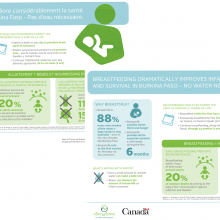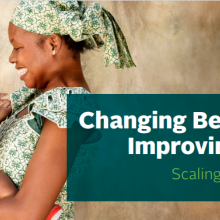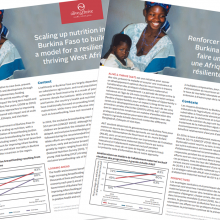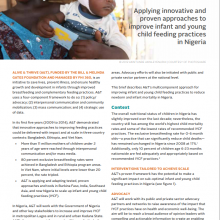Journal article
Sep 01 2016

Changes in knowledge, attitude and involvement of fathers in supporting exclusive breastfeeding: A community-based intervention study in a rural area of Viet Nam (Bich TH., 2016. International Journal of Public Health)
A one-year intervention in Viet Nam sought to understand how fathers’ knowledge, attitudes, and involvement in supporting exclusive breastfeeding (EBF) might change after receiving breastfeeding education materials and counseling services.
Poster/Graphic
May 31 2016

Breastfeeding dramatically improves infant health and survival in Burkina Faso - no water needed
Easy-to-use reference tool that highlights optimal breastfeeding practices in Burkina Faso, and is intended for use by decision-makers and stakeholders when advocating for optimal breastfeeding practices.
Brief
May 23 2016

Alive & Thrive: Changing behaviors, improving lives
Describes the Alive & Thrive initiative by outlining how and why we began, what we’ve achieved and how we’ve evolved today. Also illustrates the four component framework that we use to scale up nutrition.
Brief
Apr 13 2016

Scaling up nutrition in Burkina Faso to build a model for a resilient, thriving West Africa
This brief describes the Alive & Thrive (A&T) approach and four component framework for scaling up nutrition in Burkina Faso.
Journal article
Mar 10 2016

Supply- and Demand-Side Factors Influencing Utilization of Infant and Young Child Feeding Counselling Services in Viet Nam (Nguyen, P., 2016. PLOS One)
This study provides evidence that demand-generation strategies are essential to increase utilization of facility-based IYCF counselling services in Viet Nam, and may be relevant for increasing and sustaining use of nutrition services in similar contexts.
Brief
Feb 19 2016

Applying innovative and proven approaches to improve infant and young child feeding practices in Nigeria
The overall nutritional status of children in Nigeria has slightly improved over the last decade; nevertheless, the country still has among the world’s highest child mortality rates and some of the lowest rates of recommended IYCF practices.

